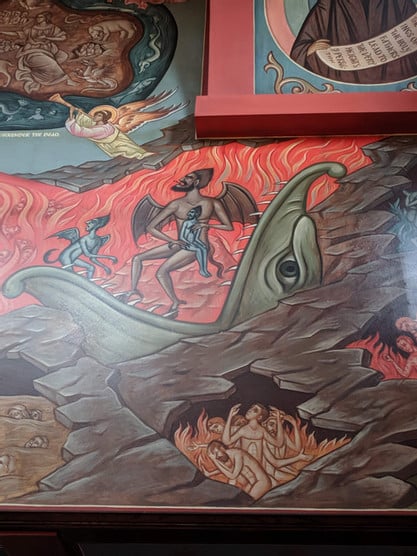“I’m not homophobic, I love the sinner, I just hate the sin.”
“Homosexuality is a sin just like every other sin.”
“Everyone has their cross to bear, yours is just same sex attraction.”
If I had a nickel for each time I’ve heard one of these phrases, I’d probably have around $142.37. The reason I wouldn’t have more is because in 2007, after subjugating myself to this type of environment for about 28 years, I stopped listening. There is still one person in my life who occasionally cannot help themselves and lets a microaggression slip out of their mouth— “But it’s only because I love you!”
The reason I allow this person in my life is a story I’ll tell elsewhere, but today I’d like to open up and peer into Pandora’s Box of the LGBTQ+ community and religious trauma.
To be honest, I’ve been both dreading and yearning for the opportunity to talk about my own religious trauma for a while. The monsters I’m about to show you have only been banished from my life since I was an adult. Before that, I let them roam freely, wreaking havoc as they gained strength from those who surrounded me. Quite frankly, I haven’t even begun to deal with them in EMDR therapy, so I’m a bit terrified about the outcome of lifting the covers and giving you a peek at the religious trauma I’ve swept under the bed of my subconscious.
Something else that makes this series difficult is the strong ambivalence I still feel towards Christianity because of a few of my lifelong friends who remain in the Church. When I moved in with my father and his wife at the age of 8, I entered a world where my left handedness was an indication I was “touched.” Copying entire books of the Bible with my right hand taught me that my other curse—homosexuality—needed to be buried so deep even I didn’t acknowledge it.
As an adult (still left-handed!) who came out of the closet in 2007 as, believe it or not, still a homosexual, most of my deeply religious friends have removed themselves from my life… Well there were some that I needed to painfully extract, but again, that’s a story for another time. There are a handful however, who have stuck around. These are friends who have caused me to linger around the doorway of the vault where I’ve sealed away all the years of painful memories.
I’ve been talking about the religious trauma syndrome and microaggressions with one of these friend for over a year now. Ideas for how to help those in our community who have experienced the “death by a thousand papercuts” are mulling around in our brain, but they have yet to produce definitive results.
The topic isn’t new, mind you. PRAYER’S FOR BOBBY by Leroy Aarons was published in 2008 and told the story of a devout Christian mother’s wrestling with her faith and the suicide of her gay son. This book was turned into an award-winning television series in 2009. Gerrard Connelly’s 2018 book and movie, BOY ERASED, is a relatively new but powerful testament to the impact of conversion therapy—a fraudulent practice attempting to change someone’s sexual orientation (or gender identity) generally though religious practices.
These are just two accounts of white, cisgender, gay, young men enduring the unnecessary consequences of Christianity gone astray. Mine is another. Despite the recent attention we’ve paid to stories like Gerrard’s (as a result of BOY ERASED, efforts to ban conversion therapy have gained strength and bans been passed in municipalities and states across the nation), there are thousands of stories left untold.
If we are to consider the vastly diverse yet perhaps even more damaging experiences of queer people of color, with differing abilities, or other intersections of diversity experiencing religious trauma at the hands of other ill-conceived interpretations of the world religions, what else would we discover? Lomash, Brown & Galupo’s 2018 study, “A Whole Bunch of Love the Sinner Hate the Sin,” looks at microaggressions LGBTQ+ people have experienced in religious contexts beyond Christianity.
So, in addition to taking the next few posts to tell some of my story about the religious trauma I’ve experienced (as well as some incredible stories of grace and healing), I’d like to hear from you. If you’d like to share your story, thoughts, or just let me know of your interest in this topic, please let me know. Your identity can be kept in confidence, or I can give you space to say your name and tell your story of the religious skeletons in your own closet.
WillKoehlerLCSW@aTraumaInformedLife.com or find me on Facebook, Twitter, or Instagram.


